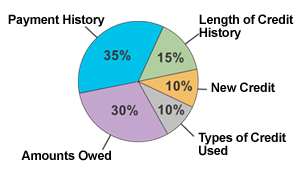
For Sarasota Florida Real Estate Excellence
Cell Phone 941.228.9682 E-Mail: cbelmont@ij.net


|
Connie Belmont, Sarasota Realtor
For Sarasota Florida Real Estate Excellence Cell Phone 941.228.9682 E-Mail: cbelmont@ij.net |

|
|
|
||
|
|
||
|
|
|
|
|
|
Credit and Credit Score FAQs |
|
What's included in a "credit report"Details about your financial behavior and identification information are contained in your personal credit report. This consumer-friendly report is sometimes called a credit file or a credit history. A copy of your credit report makes it easy for you to understand the information a lender would be seeing if they review your credit history. The typical consumer credit report includes four types of information. Public record information in some states may also include overdue child support. Bankruptcy information can remain on your credit report up to 10 years; unpaid tax liens can remain for up to 15 years; other public record information can remain up to seven years. Credit information includes specific account information, such as the date opened, credit limit or loan amount, balance and monthly payment and payment pattern. The report also states whether anyone besides you (a joint account holder or cosigner, for example) is responsible for paying the account. Active positive credit information may remain on your report indefinitely, while most negative information remains up to seven years. Requests by others to view your credit history will show you who has received information from your credit report and who was given your name during the recent past, as allowed by law. According to the Fair Credit Reporting Act, credit grantors with a permissible purpose may inquire about your credit information without your prior consent. This section includes the date of the inquiry and how long the inquiry will remain on your report. On your personal credit report ordered directly from Experian, information about those who inquired for the purposes of extending a pre-approved credit offer are included for your information. These inquiries are not revealed to creditors and do not impact your ability to obtain credit. Personal information can include your name, current and previous addresses, telephone number, reported variations of your Social Security number, date of birth and current and previous employers. "Statements of dispute" also may be added by you or your creditors. Creditors report temporary dispute statements when you challenge an account's status with them. The statement is no longer reported when the dispute is resolved, usually within 30 days. If you and your creditor cannot agree on an account's status, you may have a "statement of dispute" added to your credit history. The statement will remain for seven years. Your Experian credit report does not contain – and Experian does not collect – data about race, religious preference, medical history, personal lifestyle, political preference, friends, criminal record or any other information unrelated to credit. Nor is there information about your checking or savings accounts. Source: www.experian.com |
What is a FICO credit score ?Your credit score plays an important role in the mortgage process.
It measures your credit standing and is relied on by lenders
to determine your ability to make the scheduled mortgage payments in
a timely manner. It is, simply, the most important determinant of whether you get a mortgage loan and the interest rate you pay for that loan. |
What is included in a FICO credit score ?FICO Scores are calculated from a lot of different credit data in your credit report.
This data can be grouped into five general ncategories as outlined below. The percentages
reflect the importance of each of the categories is in determining your score. 
These percentages are based on the importance of the five categories for the general
population. For any particular group, for example, people with limited credit history,
the importance of the categories may vary. |
|
Information in this article has been drawn from various sources and while it is thought to be accurate and timely, it is not warranted. |
|
|
|
|
|
|

|
Connie Belmont, Sarasota Real Estate Agent |

|